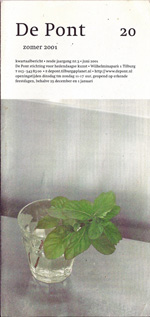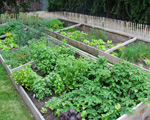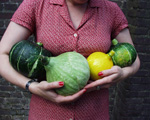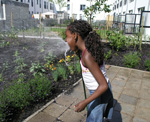|
Day Three: Designing Social Participatory System Rudy J.
Luijters Presentation During the last centuries, city gardens have developed from a protected piece of land in order to supply vegetables and fruits into a purely decorative ornament. In his presentation, Rudy J Luijters shared one of his projects on city gardening. In the project not only the original function of providing edible plants was recuperated, the opportunity of garden as a social catalyst was also explored. In 2001, Luijters was asked to make artwork in the garden of De Pont museum in Tilburg. This was in fact a recurrent practice of the museum. Every two years, the museum would invite an artist to make an artwork in the garden. Luijters decided not to make artworks in the garden in his turn, but to turn the garden into an art that could extend to the community. Luijters first paid attention to the community within the museum. So he went to the chef of the museum restaurant and asked whether the chef wanted to have vegetables and fruits directly from the garden. The answer was predictably possible. So Luijters designed that all the plants in the garden were edible. The radiant of effects of the garden was proved to be much wider with a later unexpected twist. There was an elderly home across the street; the old people saw the garden from the windows. They found it was a very delightful. So the old people visited the museum because of the garden, which was actually their first visit to the contemporary art museum in a several decades. The garden now becomes a permanent setting of museum. Luijters also showed another project of gardening at The Blue House. The garden at The Blue House encourages the residents to take part in maintaining the garden. The garden is now a gathering place for people. If public domain is defined by collective ownership and management, then garden would be a perfect site of community engagement in this sense. The methodology of social intervention might be too narrowed down to workshops. Luijters presentation shows a very creative but “natural” way of social intervention, garden could serve as a social catalyst through bringing people together. Garden maintenance will be seen as a way of exchanging ideas and not as labor work.
Biography Rudy J. Luijters (The Hague, The Netherlands, 1955) studied History of Art in the University Leiden between 1976 and 1979, and at the Sculpture Department of Artschool Amsterdam between 1979 and 1983. Since the late eighties, Luijters' work can be seen as series of cultural and natural observations and registrations, which lead to reports and arrangements. The principles of arrangement are not functional or scientifical, but rather willful and in a phenomenological sense associative. His “color identification charts” show arrangements based on color, material or structure (i.e. flowers, leaves, mosses, bark, etc.). It concerns taxonomy with a logic in itself which Luijters sets against the – mainly economical – standardization with which the world is generally measured, classified and “disenchanted”. While the registrations can take form in a series of watercolors of vegetables, fruits or mushrooms, the analysis can also result into the planting of a tree or the making of a website. Being a beekeeper is just as well part of Luijters cultural practice as growing vegetables in a museum garden and writing on cultural issues. In 2001, Luijters transformed the green space of De Pont Foundation (Tilburg) to a grateful garden. Actually (2006) working on the design of a landscape park in the Netherlands and the conversion of the site of a former electricity plant in Belgium. Luijters is also the garderner of The Blue House. Within the specific conditions of a recent city extension of Amsterdam, this garden, in which all plants are edible, functions as a social generator by extending to the community its invitation to collectively maintain. Websites: www.luijters.be; www.atelierveldwerk.nl |
| X Close | |




